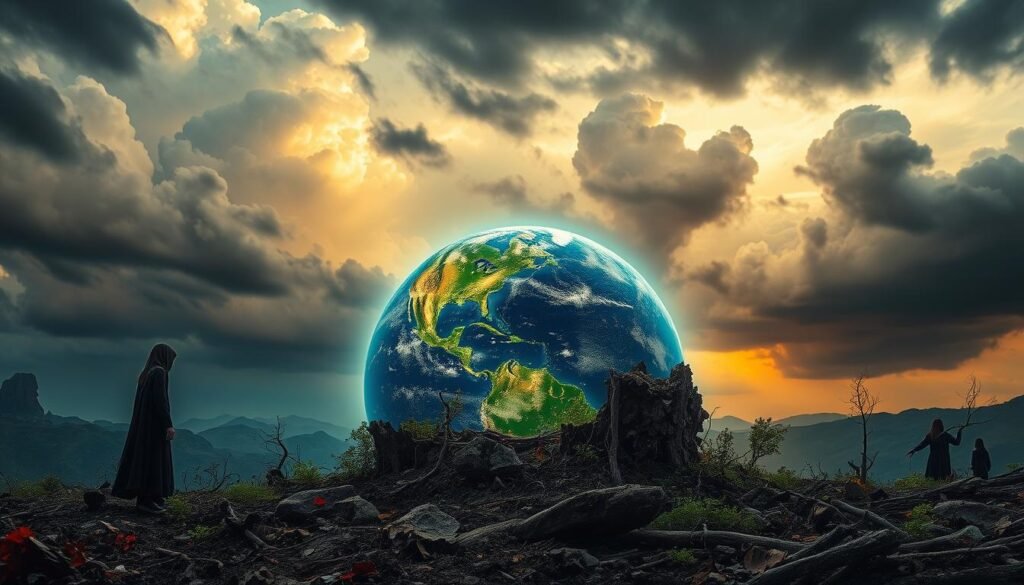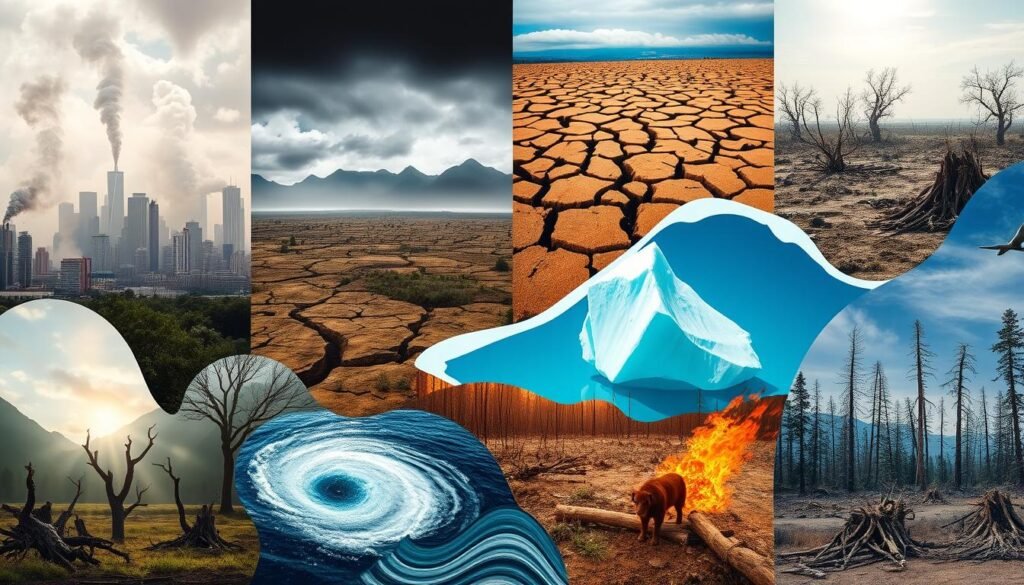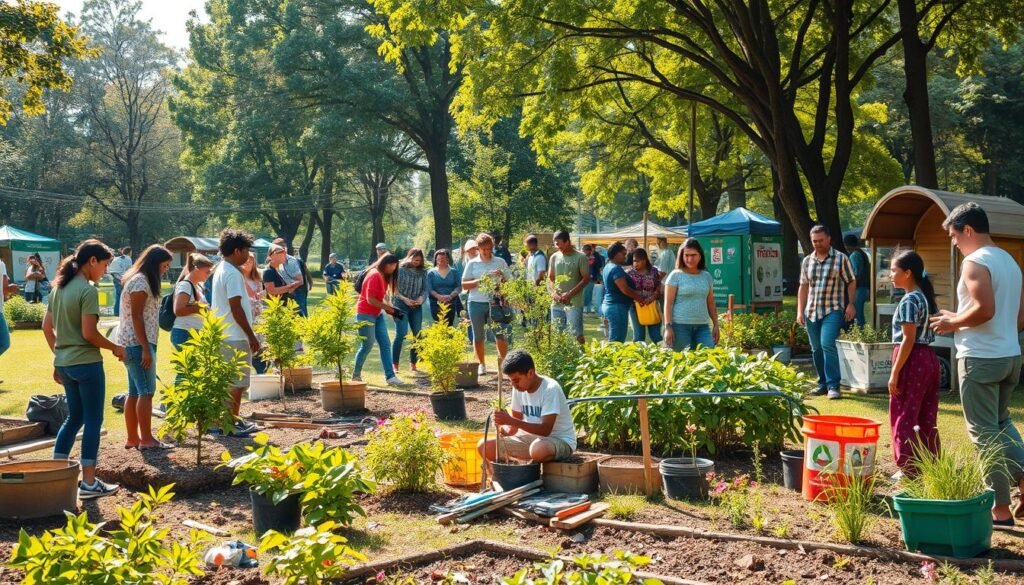Experts call climate change a huge threat to human health this century. This has made environmental stress a common problem. Eco anxiety hits 60% of young people, with nearly half saying it hurts their day-to-day life. It’s a mix of grief, guilt, and fear for our planet’s future. Because of this, it’s crucial to find ways to handle such stress.
This guide looks at eco anxiety and its causes, effects, and triggers. It also shows how to deal with these feelings. From calming anxiety with mindfulness to using community work to fight the fear, we offer helpful tips. You’ll also find educational material for further learning.
Key Takeaways
- Eco anxiety is a growing emotional response to environmental degradation and climate change.
- High temperatures linked to climate change can make mental health worse.
- Being in nature can greatly boost mental health.
- Community work can change eco anxiety into active environmental efforts.
- Experts or climate-focused groups can help manage eco anxiety well.
Understanding Eco Anxiety: The Roots of Environmental Stress
Eco anxiety is a rising worry about our planet’s health and future. It is a fear and sadness we feel, seeing the environment get worse. Studies show this kind of worry can trigger many emotions. It’s important to know what it means and how it affects us.
Defining Eco Anxiety and Its Symptoms
Eco anxiety is seen differently by scientists, but it boils down to fear caused by environmental crises. People often feel sad, guilty, and powerless, showing how deeply climate issues affect us. An in-depth review found few studies that fully explain eco anxiety. This shows how hard it is to pinpoint what eco anxiety really is. More insights on this are shared in discussions about climate anxiety.
How Climate Change and Environmental Degradation Fuel Eco Anxiety
Climate change and harming the environment can make us more stressed. This stress hits children, the elderly, and those already struggling with mental health harder. More people are feeling anxious about the environment, and it’s worrying. This anxiety threatens the mental health support and care for those in need.
The fast changes in our climate make people feel even more hopeless. Understanding these feelings helps us see how eco anxiety impacts actions towards the environment.
The Emotional Impact of Environmental Stress
Eco-anxiety is not just about worrying for our planet. It makes people feel deep grief, guilt, and hopelessness. The term “eco-trauma” explains how environmental disasters affect our minds. It shows why we urgently need ways to cope with these feelings.
Feelings of Grief, Guilt, and Hopelessness
Many folks feel sad about losing animals and natural places. They also feel guilty, thinking about how they contribute to environmental problems. This sadness and guilt can make people lose hope for what comes after us. A survey by the American Psychological Association in 2018 found that 51% of people see climate change as a major stress. This shows how common it is to feel bad about environmental decline.
The Influence of Environmental Dread on Mental Health
Worrying about the environment can really impact our mental health. It leads to anxiety, stress, not being able to sleep, and depression. Studies have found that worrying about the environment can make it hard for people to think about their futures. It even affects if they want to have kids. An amazing 68% of adults feel this eco-anxiety. And nearly half of the young adults between 18 to 34 stress about climate daily. These numbers highlight the importance of talking about these issues in our communities. They also show we need better support for mental health.

Identifying Triggers of Eco Anxiety
Understanding the triggers of eco anxiety is key to dealing with ecological stress. News is a big source of this anxiety, especially in the digital age. It brings alarming headlines that make people, especially the young, very worried. A study found that 84% of young folks are at least moderately worried about climate change. This shows how widespread emotional distress is when facing too much information.
Common Triggers: News, Social Media, and Personal Experiences
Three main sources often bring about eco anxiety:
- News Media: Sensational reports on environmental disasters make people feel hopeless.
- Social Media: Online, distressing content gets shared a lot, overwhelming people emotionally.
- Personal Experiences: Directly seeing environmental damage can trigger distressing feelings and memories.
Knowing about these triggers can help people control how much they’re exposed. You can try to watch less news or tweak your social media to calm your anxiety. Recognizing and understanding our reactions is crucial. It helps us see when we’re being misled by our fears, altering how we see the climate crisis.
The Role of Cognitive Distortions in Eco Anxiety
Cognitive biases change how we see environmental problems. These misinterpretations can lead to irrational fears, making our anxiety worse. For example, someone might think one bad news story means things will only get worse. This makes them underestimate what we can do together. Identifying these wrong thoughts is a step towards managing our anxiety. Correcting these thoughts encourages us to take positive steps, not just live in fear.
Thankfully, when we start tackling problems, we start to believe in our power to make a difference. There are many resources that help turn eco anxiety into motivation. For more tips, here’s a helpful link.

Strategies to Manage Eco Anxiety
To deal with eco anxiety, it’s key to take active steps. These include strategies that help maintain emotional balance and build resilience. For those feeling the pressure of environmental stress, mindfulness and emotional regulation techniques are very helpful. These methods not just ease anxiety but also strengthen how individuals react to climate change concerns.
Mindfulness Practices to Alleviate Anxiety
Mindfulness is a strong ally against eco anxiety. Through meditation and deep breathing, one can stay grounded in the now. This reduces the worry and fear that come with environmental problems. By doing mindfulness exercises regularly, people can find peace, lower stress, and feel better emotionally. Simple actions, like focusing on breathing or appreciating nature, offer a break from stress about climate change.
Emotional Regulation Techniques: Cognitive Behavioral Therapy
Cognitive Behavioral Therapy (CBT) is another great tool for managing eco anxiety. It helps individuals see and adjust wrong thoughts about environmental worries. By addressing these negative thoughts, one can control emotional reactions better. This change makes anxiety less powerful. CBT also provides useful ways to handle hard emotions, helping deal with environmental issues more calmly. Overall, using emotional regulation methods greatly improves handling eco anxiety.
Community Engagement: Turning Eco Anxiety into Action
Turning eco anxiety into action is all about community power. Many young adults feel anxious and hopeless about climate change. Joining local efforts can help reduce these feelings. It gives people a sense of belonging and purpose. By getting involved, you can help the environment and meet others who care as much as you do.
Volunteering for Local Environmental Initiatives
Volunteering is a great way to make a positive impact. There are many ways to help out locally, including:
- Tree planting events that enhance biodiversity.
- Community clean-up drives to restore natural habitats.
- Workshops focusing on waste reduction and recycling.
Studies show that getting involved in community projects can boost your feeling of belonging. It also increases your confidence in making a difference. Taking part in these activities can ease climate worries and make you stronger emotionally.
Building Collective Impact Through Group Advocacy
When we work together, our efforts have a bigger impact. By joining local groups, you can:
- Collaborate on sustainability initiatives.
- Participate in policy advocacy aimed at promoting eco-friendly legislation.
- Share resources and strategies for reducing personal carbon footprints.
Working with others on climate causes can make you feel part of a community. Many find their anxiety about climate change decreases when acting alongside others. This shows that being active in a community can turn worry into hope and empowerment. For more ways to turn eco anxiety into action, check out this resource.

Resources for Coping with Eco Anxiety
Looking for ways to handle eco anxiety? There are many helpful resources out there. Books and podcasts can give you new insights on the topic. They cover everything from the science of climate anxiety to personal stories. Joining local groups or online communities offers comfort and friendship. For those who want personalized help, counseling is available too.
Books and Podcasts on Eco Anxiety
Books and podcasts can be great for learning about eco anxiety. They teach you how to cope and offer hope. Look for books like “The Ecology of Hope” and “The Climate Crisis: A New Story”. These books share powerful ideas and actionable tips. Podcasts such as “Climate One” and “No Place Like Home” focus on environmental stress. They share stories that empower and offer many ways to tackle eco anxiety.
Support Groups and Counseling Options
Feeling alone with your eco anxiety? Support groups can help. You can find them at community centers or through universities. These groups provide a space to connect and share feelings. If you need more focused help, consider counseling. Therapists who know about eco anxiety can offer strategies and support. This can make a big difference in how you feel.
| Resource Type | Examples | Focus Area |
|---|---|---|
| Books | “The Ecology of Hope”, “The Climate Crisis: A New Story” | Coping strategies and environmental awareness |
| Podcasts | “Climate One”, “No Place Like Home” | Interviews, discussions, and stories related to eco anxiety |
| Support Groups | Local community centers, online forums | Building community and sharing experiences |
| Counseling | Eco-aware therapists, mental health services | Professional guidance for eco anxiety coping |
Reframing Eco Anxiety as a Tool for Change
Turning eco anxiety into a push for change can be uplifting. It’s about switching from worry to action. Realizing we have power in this situation is key. People start seeing eco anxiety as a push to find solutions, not just a cause for concern.
When we start feeling anxious, we can use that energy for good. Getting involved in the community and taking personal steps can help.
The Importance of Empowerment and Self-Efficacy
Feeling empowered allows us to tackle environmental problems head-on. It’s especially good for young people to feel they can make a difference. By doing things like nature activities and volunteering, they build confidence.
This builds a deeper bond with nature. It helps fight off feelings of being powerless. This sense of belonging supports everyone’s well-being.
Transforming Worry into Proactive Solutions
Here’s how to use your worry for something constructive:
- Join local environmental groups to build supportive networks.
- Advocate for sustainable practices within personal and professional circles.
- Engage in projects that align passion with ecological goals.
- Participate in educational programs incorporating Traditional Ecological Knowledge to enrich understanding.
Switching from worry to action does more than make you feel capable. It also helps our communities stand strong against climate change. Working together makes us all more resilient.
| Action Steps | Benefits |
|---|---|
| Joining local environmental groups | Builds community support and shared resources |
| Advocating for sustainable practices | Encourages responsible behavior and awareness |
| Engaging in relevant educational programs | Improves understanding and skills |
| Participating in nature-based activities | Enhances mental well-being and connection to the environment |
By adopting these approaches, we not only fight eco anxiety but also play an essential role in environmental improvement. Feeling empowered and capable changes our story about eco anxiety. It becomes a force for action.
Seeking Professional Help for Eco Anxiety
The journey through eco-anxiety can feel too big to handle. Knowing when to get professional help is key. Signs that you might need therapy for eco anxiety include feeling upset a lot, stress messing with your everyday life, or getting too emotional about climate news.
When to Seek Therapy for Eco Anxiety
It’s important to know what makes you feel worse. If things about the environment make you feel really hopeless, you should definitely seek mental health support. Cognitive Behavioral Therapy (CBT) can be really helpful. It lets people understand and change the way they think about eco-anxiety. This leads to more positive thinking. Trying out relaxation techniques, like mindfulness, helps you handle your feelings better and makes you stronger.
Finding Mental Health Professionals Experienced in Environmental Stress
Look for experts who know how to deal with eco-anxiety. They should talk about climate change and its effects on mental health. The The Center for Nature Informed Therapy is a good place to start looking for the right therapist. Getting involved in local environmental projects and volunteering is great too. It helps you feel like you’re part of a community and doing something important. By learning more and taking action, you can fight the emotional impact of climate change.
Conclusion
Managing eco anxiety is key for our mental health and helps us face environmental challenges better. It is said that understanding why we feel this anxiety is a big step. Doing so lets us deal with our emotions and take helpful actions. In the US, nearly 70% of people worry about climate change. This shows how important it is to be emotionally strong in facing these worries.
Community engagement and mindfulness are vital in using eco anxiety for good. Greta Thunberg’s work shows us how activism can start from our concerns. We should inspire young people especially, who are scared about climate issues, to get involved. This can change their fear into a sense of power and positivity.
Tackling eco anxiety is good for us and helps the world’s efforts against environmental problems. By following the strategies in this guide, readers can become stronger emotionally. They can also take part in solving major issues. This way, they work towards being mentally healthier and play a role in creating a greener world.